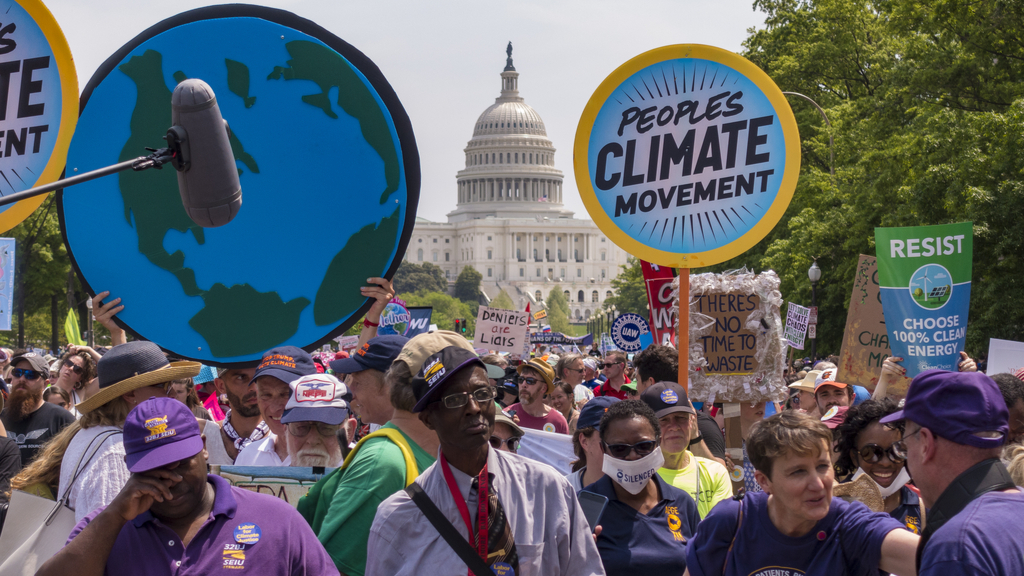US officially becomes only nation to leave the Paris Climate Agreement

As of today (Nov. 4), the U.S. will officially leave the Paris Climate Agreement, a nonbinding pact between nearly 190 nations to reduce greenhouse gas emissions and curb climate change.
The Trump administration began the formal process of exiting the Agreement on this day last year by filing the necessary paperwork to the United Nations, NPR reported. After a mandatory yearlong waiting period, the paperwork and renouncement have now been finalized.
The U.S. is now the only country to renounce the Paris Agreement after adopting it, The New York Times reported. Several countries, including Angola, Eritrea, Iran, Iraq, South Sudan, Turkey and Yemen, initially signed the pact but never formally adopted it. With the U.S. exit, 189 nations remain that have both signed and adopted the pact.
"With our exit from the accord, we are among only a few countries worldwide not signed on to the global agreement," Dr. George Benjamin, executive director of the American Public Health Association, said in a statement. "At the same time, the U.S. is the second biggest emitter of greenhouse gases in the world," following China.
"The health and environmental impacts of climate change are already here, and denying that reality and the science behind it will have devastating consequences," he said.
Related: 10 signs that Earth's climate is off the rails
The remaining signatories of the Paris Agreement aren't required to meet any specific requirements; again, the pact is nonbinding. Rather, participating countries voluntarily pledge to reduce their domestic emissions over time, setting their own targets and implementing their own policies to do so. After first signing the agreement in 2016, the Obama administration pledged to reduce U.S. emissions by about 26% to 28%, compared with 2005 levels, and to do so by 2025, according to The Times.
Sign up for the Live Science daily newsletter now
Get the world’s most fascinating discoveries delivered straight to your inbox.
Since the start of the industrial era, the U.S. has been responsible for more emissions of the greenhouse gas carbon dioxide than any other country, according to NPR, and signing the Agreement signaled the nation's commitment to reducing that burden on the world at large. However, the Trump administration has essentially reversed that stance by withdrawing from the Agreement and rolling back policies to regulate domestic emissions, Scientific American reported.
"The last four years of the Trump administration has not only been a reversal of many of the Obama policies that would have put us on track with meeting our initial obligations … [it has also been] four years of lost opportunities to continue the progress of the Obama administration," Kate Larsen, a director at the Rhodium Group, an independent research organization, told Scientific American.
Obama-era environmental policies — such as the Clean Power Plan, new fuel efficiency standards for vehicles and new regulations on methane gas — likely would not have met the ambitious pledge outlined in the Paris Agreement; but they "would have been an important first start," Larsen added. As of now, the U.S. is still on target to reach a 17% reduction in emissions by the target date, despite the rollbacks instituted under the Trump administration, NPR reported.
Related: 6 unexpected effects of climate change
Greenhouse gas emissions didn't immediately soar in response to Trump's rollbacks; their short-term impact may have been buffered by prevailing climate policies at the state and local level, as well as growth in the renewable energy sector, Scientific American reported. The economic devastation caused by the COVID-19 pandemic also temporarily curbed emissions, at least somewhat, as production slowed and people socially distanced at home.
But in the long-term, Trump's rollbacks could hinder efforts to cut emissions and will likely lead to more climate-driven disasters; in 2020 alone, 16 "weather/climate disaster events" cost the nation upwards of $16 billion, the National Oceanic and Atmospheric Administration estimates, and that cost will only grow steeper as global average temperatures rise.
"Climate change is clearly not just an environmental issue," Rachel Cleetus, policy director for the climate and energy program at the Union of Concerned Scientists, a science advocacy group, told NPR. "It is threatening our economy. It's threatening our future prosperity, the well-being of future generations."
As the U.S. pulls out of the Paris Climate Agreement, the European Union, South Korea, China and Japan have all set goals to achieve zero net emissions in the next three to four decades, according to The Times. However, the U.S. can still rejoin the Agreement in the future; should former Vice President Joseph R. Biden Jr. be elected president, he has said he would recommit to the Paris Agreement on his first day in office, The New York Times reported.
That said, if the nation recommits, the U.S. would no longer be allowed to vote on decisions made by the United Nations Framework Convention on Climate Change, a body formed through the Agreement, according to the Times. Instead, representatives from the U.S. would have observer status, meaning they could still participate in meetings and strategize with other nations, but they may not cast a vote.
Originally published on Live Science.

Nicoletta Lanese is the health channel editor at Live Science and was previously a news editor and staff writer at the site. She holds a graduate certificate in science communication from UC Santa Cruz and degrees in neuroscience and dance from the University of Florida. Her work has appeared in The Scientist, Science News, the Mercury News, Mongabay and Stanford Medicine Magazine, among other outlets. Based in NYC, she also remains heavily involved in dance and performs in local choreographers' work.









